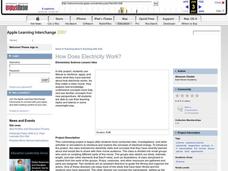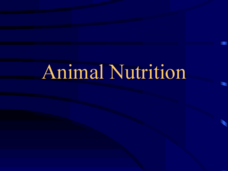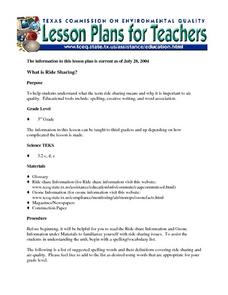Curated OER
Village Research
Sixth graders research global warming. In this science lesson, 6th graders collect data in the Waterton Townsite, Apgar Village and St. Mary area. Students interpret the data and form a hypothesis about global warming.
Curated OER
Electricity
Focusing on what electricity is and where it comes from, the information here is accessible to young scientists. The basics of how electricity is made and its uses as a power supply are given with clear illustrations. Some examples...
Wild BC
Carbon - The Short and the Long
For this complex game about the carbon cycle, the playing field is divided into air, living, and earth zones. Children are assigned to be either plants or animals, and collect carbon tokens as they proceed from zone to zone. While the...
Curated OER
Parts of the Plants that we Eat
First graders study plants and their parts to see what parts are edible. In this plant lesson students are assigned plant parts and they are to put them in the right category.
Curated OER
How Does Electricity Work?
Students use iMovie to reinforce, apply, and share what they have learned about how electricity works by making a movie as a unit culminating activity.
Curated OER
Fact or Hoax? You Decide.
Students analyze the components of debating and practice what they have learned as they conduct a class debate on the lunar landing. Both sides of the issue are researched and presented to the group.
California Academy of Science
Sustainable Fishing in the Philippines
Understanding the importance of sustainable fishing practices is fostered through a classroom game. In small groups, the class plays a fishing game where they can see first-hand, the effects of thoughtless fishing practices. After the...
Science Matters
Island Fox Outreach
Off the coast of California lives a wild animal called the Island Fox. Experts discuss the importance of the Island Fox to the Channel Islands and the balance the fox creates within its ecosystem. The lesson concludes with a reading of...
Curated OER
Bible (Day 7) Redemption and Caretakers
Whether you are religious or not, humans can be caretakers of the Earth. Students will discuss recycling, how their wasteful actions effect the Earth, and the Alaskan oil spill. They then have small group discussion and write about how...
Curated OER
Environmentally Friendly
What can your pupils do to promote better conditions for wildlife? After researching issues around wildlife management, class members use the Internet to locate three different organizations devoted to protecting wildlife. They then...
Curated OER
Biosphere
There is so much to learn about the different cycles, processes, and parts of the biosphere. Using a pretest as a formative assessment to see what your budding ecologists already know is a great way to figure out which important areas...
Curated OER
ROV Grid Search
Learners perform activities to recreate the exploration of the sea bottom. They attach magnets to the bottom of the remote controlled car to see how many camouflaged objects it can pick up. As a class, students examine the results of...
Curated OER
Scale Model of the Solar System
Lead your class through the procedure to create a scale model of the solar system. This resource reinforces concepts of scale and the mathematics involved, as well as the planets. Attach paperclips and staples to index cards to show the...
Curated OER
Roger the Rock
Here is a creative way to assess your geologists' grasp of the rock cycle: have them write and illustrate a children's book in which the main character journeys though his life, i.e. the rock cycle! A brief student instruction sheet and...
Curated OER
Links in the Chain of Life
Using the prairie dog community as an example, middle school ecologists examine the food web. Pairs of learners take one species in the community and research its role in the ecosystem. They share their findings with the rest of the...
Curated OER
A Little Flossing Goes A Long Way
Pupils explore how to floss their teeth properly. They observe a demonstration showing that bruising alone is not enough to remove plaque from all tooth surfaces.
Curated OER
Human Embryo Development and Birth Defects
Open this lesson with a discussion on birth defects. Break the class into groups to visit a website and learn about what happens at each stage of human embryo and fetal development. Assign each group a particular birth defect to...
Curated OER
Limiting Reactant
Chemistry classes learn the importance of a limiting reactant by first considering a cake recipe. Given the recipe and the total amount available for each ingredient, they must calculate how many cakes can be made. Finally, they apply...
Curated OER
Animal Nutrition
Use this great overview to give information on all aspects of nutrition. By working their way through this PowerPoint, students review a lot of information about the digestive process. Students read many facts on a number of...
Curated OER
Strawberry DNA extraction
Students study the basic function of DNA and then extract it from strawberries. In this DNA extraction instructional activity students examine DNA and see why the extraction of it is so important to scientists.
Curated OER
Body Systems
Pupils view a video, they summarize the function or job of each body system. They are asked why is it important that athletes in training or a person who wants to tone muscles or stay healthy should comprehend how the systems could help...
Curated OER
What is Ride Sharing?
Third graders discover the concept of ride sharing. They discuss how it helps the environment. They use the internet to gather information as well.
Curated OER
Engaging Young Scientists with Inquiry: Part Two
Evaluating data and learning to communicate the results is a big piece of the inquiry puzzle.
Scholastic
Recovery From Drug Addiction
Are there factors that put some individuals at a higher risk for drug addiction than others? Learn more about the risk factors that may make some people more susceptible to addiction, as well as protective factors that help prevent...























